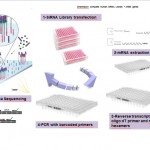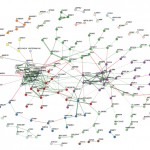Summary
We study molecular mechanisms that control alternative splicing mRNA precursors. This process is essential for the regulation of eukaryotic genes and plays important roles in human disease, including tumour progression.
Progress during 2015 included 1) the genome-wide identification of regulators of Fas/CD95 alternative splicing, relevant for the control of programmed cell death (Figure 1); 2) the reconstruction of the network of functional relationships of the components of the spliceosome regarding their activities in alternative splicing regulation (Figure 2); 3) finding a role for changes in nucleosome positioning for progesterone-induced alternative splicing and association of promoter-like epigenetic signatures with cell type-specific exon inclusion (collaboration with Miguel Beato and Roderic Guigó); 4) finding evidence for the role of six nucleotide polymorphisms, risk factors in coronary disease, in OLR1 alternative splicing; and 5) using label-free real-time plasmonic sensing for the quantitative evaluation of alternatively spliced mRNA isoforms (in collaboration with Laura Lechuga, ICN2, Barcelona).
Research projects
- Role of RNA binding proteins RBM5, RBM6 and RBM10 in the control of cancer cell proliferation through alternative splicing of the Notch regulator NUMB (collaboration with Manuel Serrano, CNIO, Madrid).
- Mechanisms of alternative splicing regulation of the Fas receptor, including a genome-wide screen for regulators.
- Functional network analysis of alternative splicing regulation: role of core components of the splicing machinery on splice site selection and splicing complexes involved in the control of cell division.
- Role of nucleosome positioning and chromatin modifications in alternative splicing regulation (collaboration with the groups of Miguel Beato and Roderic Guigó, CRG).
- Role of lncRNAs in alternative splicing regulation (collaboration with the group of Roderic Guigó, CRG).
- Structure / function analysis of RBM protein OCRE domains (in collaboration with the groups of Michael Sattler, Helmholtz Zentrum, Munich and Cédric Notredame, CRG).
- Mechanisms of splicing inhibition by anti-tumor drugs targeting components of the core splicing machinery (collaboration with the group of Fernando Albericio, IRB, Barcelona).
- Role of RNA-DNA R-loops in alternative splicing regulation (collaboration with the group of Alberto Kornblihtt, Buenos Aires).
- Role of U2AF35-like factors in male fertility (collaboration with Alfonso Gutiérrez Adán, INIA, Madrid).
- Role of alternative splicing regulation in cell reprogramming (collaboration with Thomas Graf, CRG).
- Functional impact of cancer-associated mutations on SF3B1 function (collaboration with Dolors Colomer and Elias Campo, Hospital Clinic, Barcelona and with Carles Besses, Hospital del Mar).
- Systematic analysis of regulatory sequences in alternative exons (collaboration with Ben Lehner, CRG).
- Splicing regulatory networks in cancer (collaboration with Eduardo Eyras, UPF).
- Splicing regulatory networks in cellular stress (collaboration with Francesc Posas, UPF).

